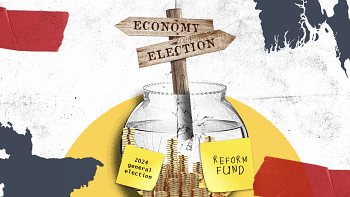Can the government keep its pledge of reform measures to IMF?

The government's pledge to take more than 50 reform measures in three years under the IMF's loan programme is heartening. The reforms are especially necessary to restore macroeconomic stability and bring about structural changes—which are somewhat, if not greatly, interconnected. External shocks have undoubtedly destabilised our economy over the past three years. But their effects could have been mitigated much better had the foundations of our economy been stronger. And that is where structural reforms must come in. Additionally, even though the IMF eased two of its conditions to approve the second tranche of the loan for Bangladesh, meeting future preconditions will also require the implementation of various reforms.
According to the plan, the government will analyse existing tax subsidies and use it to rationalise tax expenditures. Moreover, it will formulate medium- and long-term revenue strategies to provide a structured framework to improve revenue collection over the next four to six years. While both these measures sound promising, the key lies in their implementations. Calls for such measures by experts have gone ignored for years. Thus, we cannot but remain somewhat sceptical on how serious and capable the government truly is in regards to implementing them.
Additionally, the government has to keep in mind that while implementing these reforms, it must seek to avoid increasing inequality any further. In its pursuit to increase tax collection—one of the IMF's preconditions—the government should avoid burdening the lower and middle classes any further and instead bring tax evaders, most of whom have huge earnings, under its tax net.
In order to safeguard priority spending—which we hope includes measures such as social safety net programmes for vulnerable groups—the government said it is committed to containing subsidies and not including capacity charges which have wasted exorbitant amounts of national resources. Although the latter would prove extremely beneficial for the economy, we fear whether the government will indeed have the courage to set aside political considerations to take such a step, given its past records. Similarly, its pledge to reduce non-performing loans (NPLs) in the banking sector has to be taken with a pinch of salt, given that its past decisions have arguably allowed NPLs to balloon to the most absurd extremes.
To minimise borrowing costs, the government said it wants to cut reliance on national savings certificates and look towards other sources of financing. However, given that many vulnerable groups are currently heavily reliant on interest from these, the government should do so carefully and without impacting them too negatively.
Follow The Daily Star Opinion on Facebook for the latest opinions, commentaries and analyses by experts and professionals. To contribute your article or letter to The Daily Star Opinion, see our guidelines for submission.

 For all latest news, follow The Daily Star's Google News channel.
For all latest news, follow The Daily Star's Google News channel. 









Comments